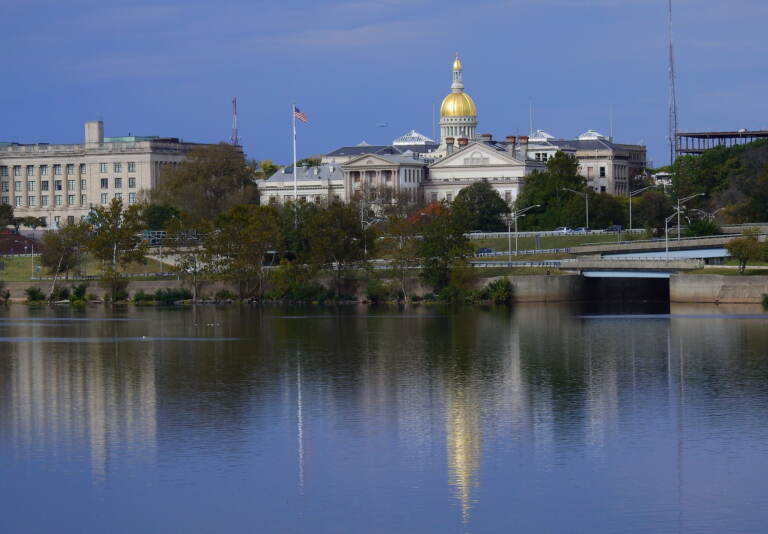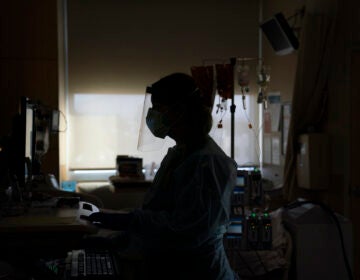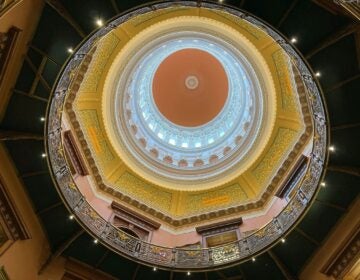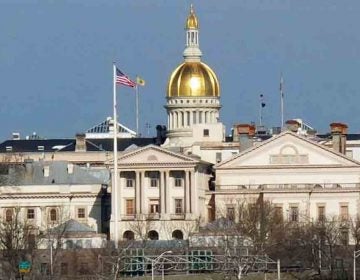New N.J. budget: A look behind the numbers of $50.6B spending proposal
Largest spending plan in state history funds school construction, pension obligations, tax relief — and lawmakers’ pet projects

The state Capitol building in Trenton, New Jersey. (Evelyn Tu for WHYY)
This story originally appeared on NJ Spotlight
Billions in new spending on everything from school construction to lead-paint remediation is up for final approval Wednesday alongside a record state budget lifted by an unprecedented surge in tax collections.
For starters, lawmakers in both houses of the Legislature are planning to vote on a $50.6 billion annual budget, just in time for the fiscal year that begins Friday.
The legislative spending bill includes funding for beefed-up direct property-tax relief, but also dozens of last-minute additions, including pet projects that majority Democrats tacked onto a budget plan first drafted by Gov. Phil Murphy several months ago.
Meanwhile, other language inserted into the budget will dictate how more than $2 billion in federal pandemic aid for New Jersey will be divvied up. Those appropriations call for new spending on hospital upgrades, college and university facilities and lead-paint remediation in homes, among many other items.
And then there’s nearly $3 billion more in state dollars earmarked for other capital projects thanks to a revenue surge that helped generate a massive, nearly $11 billion projected surplus.
That list of spending — which is intended to keep the state from having to issue new long-term debt — includes rail and road projects and long-sought school construction funding, according to legislation moving quickly through the Legislature along with the budget bill.
Murphy, a second-term Democrat, is expected later this week to sign the budget virtually unchanged after spending the last few weeks in behind-the-scenes negotiations with key legislative leaders.
Rushed process
For their part, Republicans who are in the minority in both the Assembly and Senate are crying foul after failing to get their Democratic counterparts to sign off on their version of major tax rebates funded amid the state’s revenue surge.
Meanwhile, the state GOP and representatives from several citizen-activist groups are also raising new concerns about transparency after Democrats drafted the new budget and held rushed committee votes to approve it — all before copies of the 277-page budget bill were posted for public review on the Legislature’s website.
But many elements of the new version of the budget up for final consideration Wednesday are receiving praise, including a $75 million “municipal relief fund” that will begin to restore energy tax receipts that have been diverted for years from municipal governments, putting more pressure on local property taxes.
A separate piece of legislation funded in the new budget will lead to a state-level child tax credit worth as much as $500.
Other budget language will also dictate legislative oversight of more than $1 billion in additional federal pandemic relief dollars that have yet to be appropriated by Murphy and lawmakers. The same language will also apply to funding that’s been set aside for “debt defeasance and prevention,” an effort launched last year after the state borrowed money to sustain the budget during the first year of the pandemic.
The list of projects in line for funding through the debt-relief fund includes $1.9 billion for school construction through the state Schools Development Authority. There’s also money for Newark Penn Station upgrades and the Walter Rand Transportation Center in Camden, as well as funding for a Lincoln Tunnel access project and an I-295 highway project.
Happy holidays
And then there’s the funding lawmakers have earmarked for their own pet projects and other legislative priorities known as “Christmas-tree items,” a State House coinage that conjures up the image of the New Jersey treasury as a bounty of cheerful holiday gifts.
Among this year’s add-ons are $3 million in funding for a skating rink and rec center in East Brunswick, $7.5 million for a park in Newark and $10 million for “parks and trails” in Camden County, according to budget documents.
Meanwhile, written “budget resolutions” that are supposed to indicate which lawmakers requested individual spending add-ons have yet to be released by legislative leaders in either house. And the rushed approval of the annual spending bill by budget committees late Monday night made it virtually impossible for the public to comment on — or even for lawmakers to understand — nearly 370 separate changes made to the original budget proposal that Murphy drafted in March.
In all, the changes added more than $1.7 billion in spending, not accounting for additional costs embedded in new budget language provisions, according to an NJ Spotlight News analysis.
Some of the changes appear to stem from savings or spending reductions in a number of programs, including those involving early-childhood intervention, health care subsidies and Medicare and Medicaid services. Excluding these savings, legislators added $2.3 billion in new spending to the budget, according to the analysis.
Republicans and progressives alike are once again airing concerns about the budget-approval process and calling for reforms.
Tom Szymanski, executive director of the New Jersey State Republican Committee, called the process “opaque,” adding “clearly Democrats learned nothing from the beating they took at the ballot box last November.” Democrats lost a net seven seats in the Legislature last year.
“New Jersey’s budget-making process is fundamentally broken, and this year was even worse than usual,” said Nicole Rodriguez, president of the left-leaning New Jersey Policy Perspective.
However, Assembly Speaker Craig Coughlin (D-Middlesex) recently said on Reporters Roundtable, NJ Spotlight News’ public-affairs program, that because the Legislature holds dozens of hearings on Murphy’s budget proposal over a period of months, he considers the process transparent.
“Our planned investments build meaningfully on the Governor’s proposal and months of public input to support New Jersey communities now and into the future,” Coughlin said in a statement issued late Monday.
— Colleen O’Dea contributed to this story.
WHYY is your source for fact-based, in-depth journalism and information. As a nonprofit organization, we rely on financial support from readers like you. Please give today.






